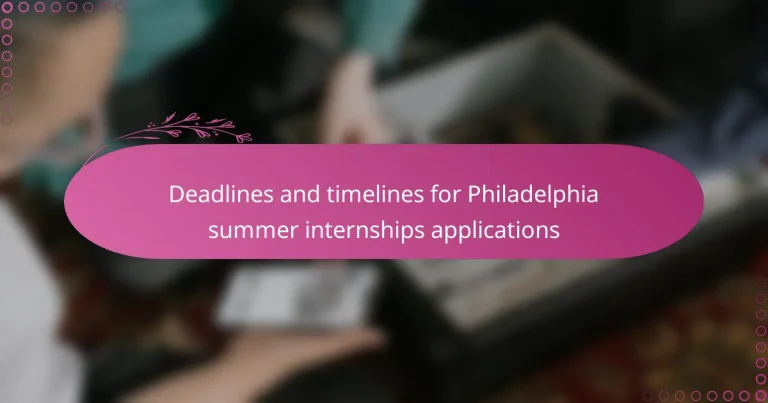

What are networking strategies for securing Philadelphia summer internships?
Building a professional network is essential for securing summer internships in Philadelphia. Start by attending local career fairs and networking events to meet industry professionals. Utilize platforms like LinkedIn to connect with alumni from your school who are working in Philadelphia. Join relevant professional organizations or clubs that focus on your field of interest. Informational interviews can provide insights and open doors; reach out to professionals for brief meetings. Volunteer or participate in community events to expand your network. Follow up with contacts after meeting them to maintain relationships. Research local companies and reach out directly to inquire about internship opportunities. These strategies enhance visibility and increase the likelihood of securing internships.
How can networking enhance internship opportunities in Philadelphia?
Networking can significantly enhance internship opportunities in Philadelphia. Building connections with professionals in the industry can lead to insider information about available positions. Networking events, such as career fairs and industry meetups, are prevalent in Philadelphia. These events provide direct access to employers looking for interns. Engaging with alumni from local universities can also open doors to internship opportunities. Many companies prefer referrals from trusted sources over general applications. Networking can also help individuals gain valuable insights into company cultures and expectations. This knowledge can improve application quality and interview performance. Thus, effective networking is a crucial strategy for securing internships in Philadelphia.
What types of networking events are available in Philadelphia?
Types of networking events available in Philadelphia include professional meetups, industry conferences, and workshops. Professional meetups often focus on specific sectors, providing opportunities for attendees to connect with like-minded individuals. Industry conferences feature keynote speakers and panel discussions relevant to various fields, facilitating networking among professionals. Workshops offer hands-on learning experiences, allowing participants to build skills while engaging with peers. Additionally, networking breakfasts and happy hours are common, promoting casual interactions in a relaxed environment. These events are organized by local business groups, universities, and professional associations, providing diverse opportunities for networking.
How do personal connections influence internship placements?
Personal connections significantly influence internship placements by providing access to opportunities. These connections often lead to referrals, which can enhance an applicant’s chances. Employers frequently prioritize candidates who come recommended by trusted sources. According to a survey by Jobvite, 70% of employers consider referrals a key factor in hiring. Networking can also provide insider information about internship openings. This information can be crucial in a competitive job market. Additionally, personal connections can offer mentorship and guidance throughout the application process. This support can improve the quality of applications and interviews. Ultimately, leveraging personal connections can create a strategic advantage in securing internships.
Why is Philadelphia a unique market for summer internships?
Philadelphia is a unique market for summer internships due to its diverse industries and rich historical context. The city hosts major sectors like healthcare, education, and technology. This variety provides numerous opportunities for interns across different fields. Additionally, Philadelphia’s proximity to major metropolitan areas enhances networking possibilities. The city is home to prestigious universities, fostering a strong talent pool. Local organizations often seek interns from these institutions, creating a competitive advantage. Furthermore, Philadelphia’s vibrant cultural scene attracts companies looking for creative and innovative interns. This combination of factors makes Philadelphia a distinctive landscape for internship seekers.
What industries are thriving in Philadelphia during the summer?
Tourism and hospitality are thriving industries in Philadelphia during the summer. The city attracts millions of visitors each year, especially in the warmer months. This influx boosts hotels, restaurants, and entertainment venues. Additionally, the outdoor festivals and events drive demand for various services. The healthcare sector also sees increased activity due to seasonal health programs. Moreover, the education sector benefits from summer programs and internships. These industries provide numerous opportunities for internships during this vibrant season.
How does Philadelphia’s internship culture differ from other cities?
Philadelphia’s internship culture emphasizes strong local industry connections. Many internships are tied to the city’s prominent sectors, such as healthcare, education, and technology. This focus provides students with hands-on experience relevant to their fields. The city also boasts a collaborative environment among universities and businesses. Programs often encourage mentorship and networking opportunities. Additionally, Philadelphia hosts various internship fairs and networking events throughout the year. These events facilitate direct connections between interns and employers. Compared to other cities, Philadelphia’s internship culture fosters a unique blend of community engagement and practical experience.
What are the essential networking skills needed for securing internships?
Essential networking skills for securing internships include effective communication, relationship building, and active listening. Effective communication involves clearly articulating your goals and interests. Relationship building focuses on establishing and maintaining connections with professionals in your field. Active listening allows you to understand others’ perspectives and respond appropriately.
Additionally, networking requires confidence in self-presentation. This includes showcasing your skills and experiences succinctly. Networking also benefits from follow-up skills. Following up with contacts reinforces connections and demonstrates your interest.
Research shows that 85% of jobs are filled through networking, emphasizing its importance in securing internships. These skills are crucial for creating opportunities and gaining insights into the industry.
How can effective communication improve networking outcomes?
Effective communication enhances networking outcomes by fostering clearer connections among individuals. Clear communication helps convey intentions and interests accurately. It builds trust and rapport between networkers. Strong interpersonal skills can lead to more meaningful interactions. Research shows that effective communication increases the likelihood of follow-up opportunities. According to a study by the Harvard Business Review, 85% of job success is attributed to effective communication skills. This statistic underscores the importance of communication in professional networking.
What role does follow-up play in successful networking?
Follow-up plays a critical role in successful networking. It helps to reinforce connections made during initial interactions. A timely follow-up demonstrates professionalism and genuine interest. This can be done through emails, messages, or calls. Research shows that 80% of sales require five follow-ups to close. Similarly, in networking, consistent follow-up can lead to opportunities. It keeps the connection alive and memorable. Moreover, follow-up allows for the sharing of additional information or resources. This enhances the relationship and can lead to future collaborations or referrals.
How can students leverage social media for networking?
Students can leverage social media for networking by actively engaging with professionals in their field. They should create a polished LinkedIn profile that highlights their skills and experiences. Joining relevant groups on platforms like LinkedIn and Facebook can provide access to industry discussions and job postings. Students can follow companies they are interested in and interact with their content to build visibility. They should also reach out to alumni from their university for informational interviews. Additionally, sharing their own insights and projects on social media can showcase their expertise. According to a survey by the National Association of Colleges and Employers, 73% of employers use social media to recruit candidates. This statistic underscores the importance of a strong social media presence for networking opportunities.
What platforms are most effective for connecting with potential employers?
LinkedIn and Indeed are the most effective platforms for connecting with potential employers. LinkedIn allows users to create professional profiles and network with industry professionals. It features job postings and opportunities for direct messaging employers. Indeed aggregates job listings from various sources, making it easy to search for internships. Both platforms offer tools for showcasing skills and experiences. According to a 2022 survey by Jobvite, 87% of recruiters use LinkedIn to find candidates. This statistic underscores the platform’s effectiveness in job searching and networking.
How can students create a professional online presence?
Students can create a professional online presence by utilizing platforms like LinkedIn. They should create a complete profile with a professional photo and detailed work experience. Regularly updating their profiles with relevant skills and accomplishments is essential. Engaging with industry-related content can showcase their interests and knowledge. Networking with professionals in their field through connections is vital. Students should also join relevant groups to participate in discussions. Sharing insights or articles can further establish their expertise. Consistency in their online branding across platforms strengthens their professional image.
What are the best practices for networking in-person?
The best practices for networking in-person include being prepared, making a strong first impression, and following up. Preparation involves researching attendees and having clear goals. A strong first impression can be achieved through confident body language and a friendly demeanor. Active listening is crucial for engaging conversations. Additionally, exchanging contact information helps maintain connections. Following up within a few days reinforces relationships. According to a survey by LinkedIn, 85% of jobs are filled through networking, highlighting its importance. Networking effectively can significantly enhance opportunities for summer internships in Philadelphia.
How should students prepare for networking events?
Students should research the event and attendees beforehand. Understanding the industry and key players helps in making connections. They should prepare a concise elevator pitch. This pitch should summarize their background and goals. Practicing this pitch boosts confidence during interactions. Students should also bring business cards to share contact information. Dressing professionally is crucial for making a positive first impression. Following up with new contacts after the event solidifies connections. These strategies enhance networking effectiveness and increase internship opportunities.
What etiquette should be followed during networking interactions?
During networking interactions, it is essential to maintain professionalism and respect. Begin with a firm handshake and make eye contact to convey confidence. Introduce yourself clearly, stating your name and purpose. Listen actively to others without interrupting, showing genuine interest in their insights. Follow up with a thank-you note or email after the interaction, reinforcing your appreciation. According to a survey by LinkedIn, 85% of jobs are filled through networking, highlighting the importance of positive interactions. Proper etiquette fosters lasting connections and enhances professional opportunities.
How can students build and maintain professional relationships?
Students can build and maintain professional relationships by actively engaging with their network. They should attend industry events and workshops to meet professionals. Utilizing platforms like LinkedIn can help students connect with industry leaders. Regular communication is vital; students should follow up with contacts after meetings. Offering assistance or sharing relevant information can strengthen these relationships. Joining professional organizations provides additional networking opportunities. Participating in internships allows students to build connections in real work environments. Consistency in maintaining these relationships is crucial for long-term success.
What strategies can be used to keep in touch with contacts?
Regularly reach out to contacts through personalized emails or messages. Schedule periodic check-ins to maintain relationships. Share relevant articles or resources to provide value. Attend networking events to reconnect in person. Utilize social media platforms for updates and engagement. Send holiday greetings or birthday wishes to show appreciation. Leverage professional networking sites to keep profiles updated and visible. Follow up after meetings or events to reinforce connections.
How can networking evolve into mentorship opportunities?
Networking can evolve into mentorship opportunities through relationship building and mutual interests. Engaging in meaningful conversations allows individuals to identify shared goals. This connection can lead to more in-depth discussions about career aspirations. As trust develops, professionals may offer guidance and support. Mentorship often grows from initial networking interactions. For instance, a casual meeting can transform into regular check-ins. According to a survey by the National Mentoring Partnership, 55% of mentored individuals reported career advancement. This statistic highlights the value of transitioning from networking to mentorship.
What common challenges do students face in networking for internships?
Students face several challenges in networking for internships. One common challenge is a lack of connections. Many students do not have established professional networks. This makes it difficult to find opportunities. Another challenge is limited experience in networking itself. Students may feel unsure about how to approach professionals. Fear of rejection can also hinder networking efforts. Students often worry about making a bad impression. Additionally, time constraints can be a significant issue. Balancing schoolwork and networking can be overwhelming. Lastly, students may not know how to effectively leverage social media. Many are unsure how to use platforms like LinkedIn for networking. These challenges can impede students’ ability to secure internships.
How can students overcome anxiety related to networking?
Students can overcome anxiety related to networking by preparing in advance. Practicing elevator pitches boosts confidence. Researching individuals or companies helps students feel more informed. Setting realistic goals for networking events reduces pressure. Attending workshops on networking skills can provide valuable techniques. Engaging in role-playing scenarios with peers can simulate real-life interactions. Utilizing online platforms for initial connections can ease face-to-face anxiety. Gradually increasing networking opportunities builds comfort over time.
What should students do if they feel unprepared for networking?
Students should take proactive steps to prepare for networking. They can start by researching the industry and identifying key players. Practicing their elevator pitch can boost confidence. Students should also seek mentorship from experienced professionals. Attending workshops or networking events can provide valuable experience. Role-playing networking scenarios with peers can enhance skills. Finally, students should reflect on their strengths and how they can contribute to potential connections.
What practical tips can enhance networking success for internships?
Building meaningful connections enhances networking success for internships. Attend industry events and workshops to meet professionals. Use platforms like LinkedIn to connect with alumni and industry leaders. Prepare an elevator pitch to introduce yourself effectively. Follow up with contacts after meetings to maintain relationships. Offer to help others in your network, fostering reciprocity. Join relevant professional organizations to expand your reach. Participate in informational interviews to gain insights and advice. Tailor your communication style to match your audience for better engagement.
Networking strategies for securing Philadelphia summer internships are essential for students seeking to enhance their professional opportunities. The article outlines various methods to build a professional network, including attending career fairs, leveraging social media platforms like LinkedIn, and participating in local events. It emphasizes the importance of personal connections and effective communication in increasing internship placements, while also detailing the unique aspects of Philadelphia’s internship market and the thriving industries during the summer. Additionally, the article provides practical tips for overcoming networking challenges and maintaining professional relationships, ultimately highlighting the critical role of networking in achieving internship success.





